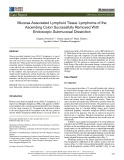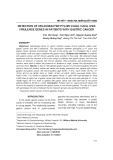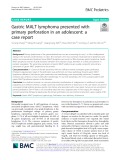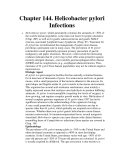
Gastric MALT lymphoma
-
Mucosa-associated lymphoid tissue (MALT) lymphoma is a type of non-Hodgkin lymphoma with characteristic histopathological features and can occur in various extranodal sites, including the gastrointestinal tract. While gastric MALT lymphoma has been extensively researched, primary lymphoma presentation in the colorectal mucosa is rare and lacks any association with Helicobacter pylori infection.
 5p
5p  viintuit
viintuit
 26-09-2023
26-09-2023
 3
3
 0
0
 Download
Download
-
Helicobacter pylori (H. pylori) infection causes chronic gastritis, peptic ulcer, gastric cancer and MALT-lymphoma. The association between genotypes of H. pylori and gastric cancer remains controversial. The aim of this study was: To investigate the H. pylori vacA alleles, iceA and cagA in patients with gastric cancer.
 8p
8p  viminnesota2711
viminnesota2711
 22-03-2021
22-03-2021
 11
11
 1
1
 Download
Download
-
Primary lymphomas of the gastrointestinal tract are rare, accounting for only 1 to 4% of malignancies arising in the stomach, small intestine, or colon. The stomach is the most common extranodal site of lymphoma and gastric mucosa-associated lymphoid tissue (MALT) lymphoma accounts for 40% of primary gastric lymphoma.
 5p
5p  vidublin2711
vidublin2711
 13-01-2020
13-01-2020
 14
14
 1
1
 Download
Download
-
With a relatively high incidence and unique clinicopathological features, gastric lymphoma has recently become an important area of cancer research. In 1983, Isaacson and Wright described a group acquisition of gastric MALT in H pylori infection facilitates the of extranodal low-grade B-cell lymphomas derived from Peyer development of gastric MALT lymphoma.6 patch–like structures of mucosa-associated lymphoid tissue(MALT)in the stomach, salivary glands, lungs and thyroid gland.
 9p
9p  thaodien102
thaodien102
 06-11-2015
06-11-2015
 46
46
 2
2
 Download
Download
-
Helicobacter pylori is a Gram-negative bacterium that has been associated with diverse pathologies of varying severity, such as chronic gastritis, peptic ulcer, mucosa-associated lymphoid tissue (MALT) lymphoma, and gastric carcinoma.1 Although most infected persons remain asymptomatic, 15–20% of H. pyloripositive individuals will develop the associated diseases. This could be dependent on environmental factors, host genetic factors or specific properties of the microorganism.1
 5p
5p  nguyendangbao1965
nguyendangbao1965
 04-06-2015
04-06-2015
 46
46
 4
4
 Download
Download
-
Helicobacter pylori, which persistently colonizes the stomachs of ~50% of the world's human population, is the main risk factor for peptic ulceration (Chap. 287) as well as for gastric adenocarcinoma and gastric MALT (mucosa-associated lymphoid tissue) lymphoma (Chap. 87). Treatment for H. pylori has revolutionized the management of peptic ulcer disease, providing a permanent cure in many cases. The prevention of H. pylori colonization could potentially represent primary prevention of gastric malignancy and peptic ulceration.
 11p
11p  crazy_sms
crazy_sms
 08-05-2012
08-05-2012
 57
57
 3
3
 Download
Download
-
Evaluation of patients with MALT lymphoma follows the pattern (Table 105-11) for staging a patient with non-Hodgkin's lymphoma. In particular, patients with gastric lymphoma need to have studies performed to document the presence or absence of H. pylori infection. Endoscopic studies including ultrasound can help define the extent of gastric involvement. Most patients with MALT lymphoma have a good prognosis, with a 5-year survival of ~75%. In patients with a low IPI score, the 5-year survival is ~90%, while it drops to ~40% in patients with a high IPI score.
 5p
5p  thanhongan
thanhongan
 07-12-2010
07-12-2010
 72
72
 3
3
 Download
Download
CHỦ ĐỀ BẠN MUỐN TÌM



















